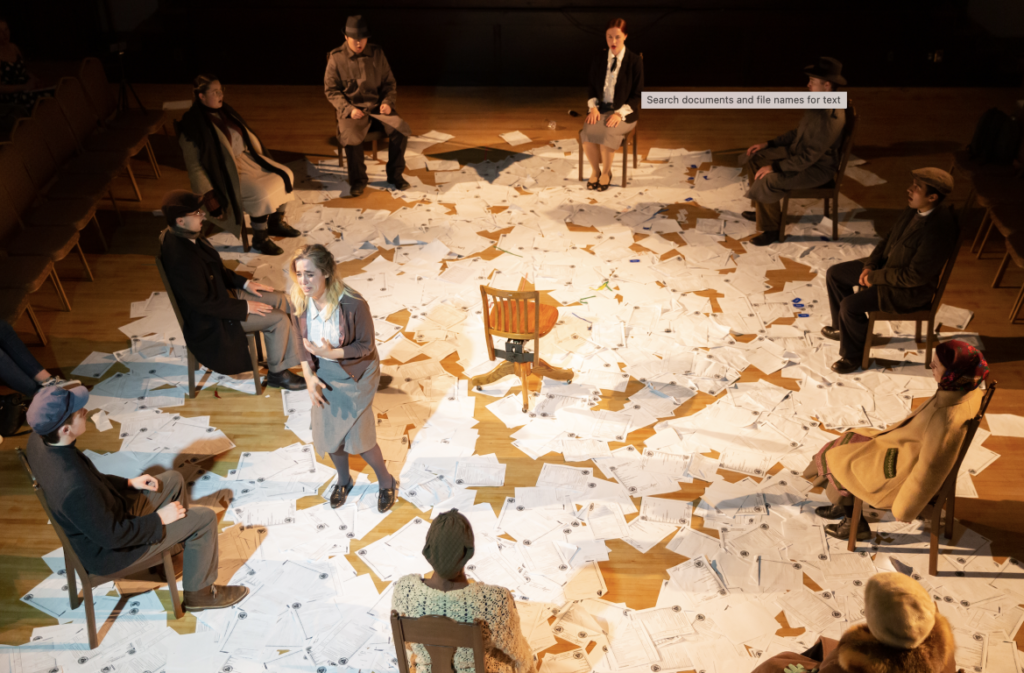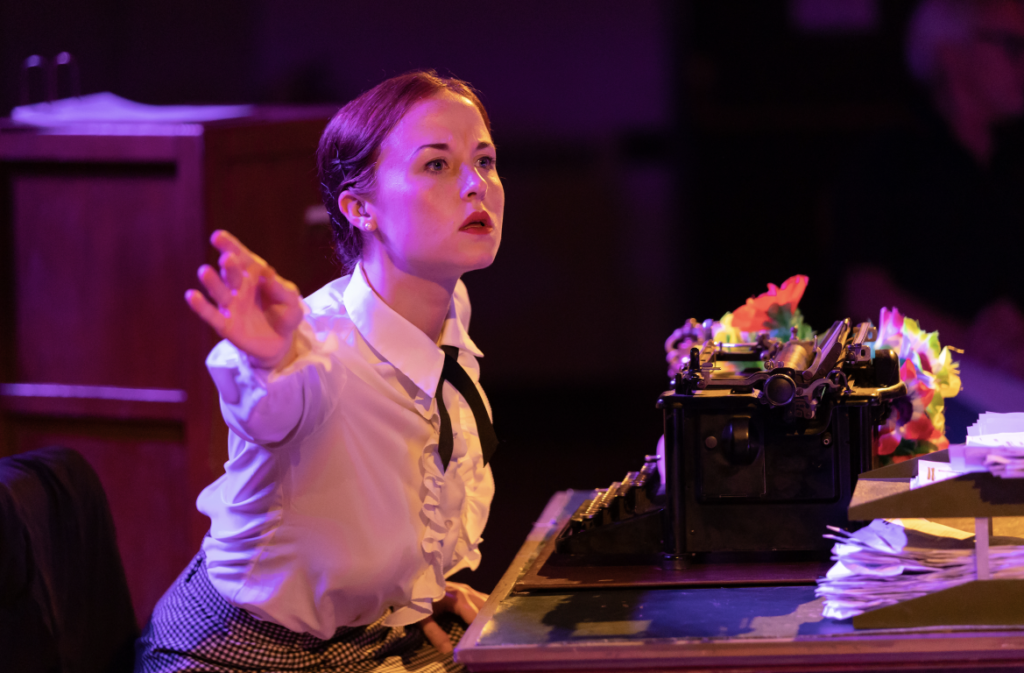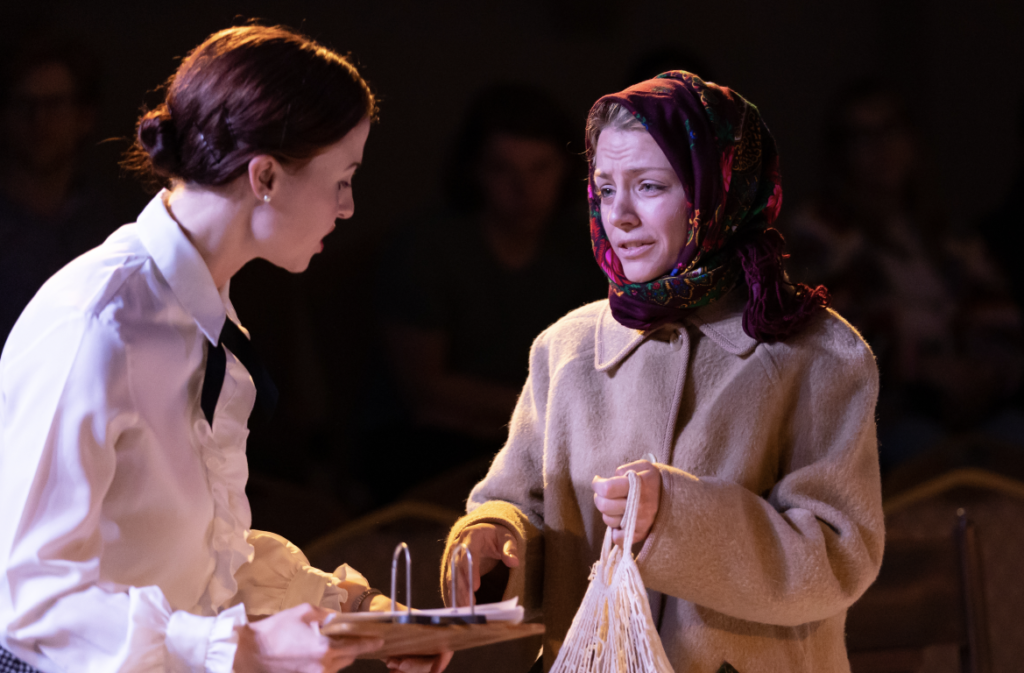Opera Nuova’s The Consul is a fascinating evening, albeit a harrowing and a timely one

Review by Mark Morris
Photographs by Nanc Price Photography
Opera Nuova
Conductor: Gordon Gerrard
Director: Brian Deedrick
Costume Design: Josée Chartrand
Lighting Design: Brock Keeler
Freemason’s Hall
10318 100 Ave NW, Edmonton
June 29, 2022
(Repeated June 30, July 2, both 7:30 pm, and July 3, 1.30 pm)
Sung in the original English
The Italian-American composer Carl Menotti’s first full-length opera, The Consul, is probably better known by name than in performance, and for its ‘Lullaby’, often sung on its own. Indeed, Menotti’s works in general do not have the reputation they deserve, in part because their idiom in the 1950s and 1960s was seen to be very conservative in a period when most critical attention was on the far-reaching developments in contemporary music.
But when The Consul appeared on Broadway in 1950 it was a sure-fire hit. It ran for nearly eight months, and won both the Pulitzer Prize for Music, and (in 1954) the New York Drama Critic’ Circle Award for Musical Play of the Year.

Now, some 72 years later, those arguments about an old-fashioned idiom are less relevant. Indeed, Brain Deedrick’s production for Opera Nuova, which opened at the Freemason’s Hall on June 29, showed pretty convincingly that, while Menotti’s later operas do sound old-fashioned, the same cannot be said for The Consul, in either musical or dramatic (or indeed political) terms. And like all great art, its harrowing story turns out to be as relevant today as it was when the Cold War was ramping up, and Senator McCarthy had started his communist witch-hunts.
It is set in unidentified European totalitarian country, where a young radical escapes across the border, leaving his wife, Magda, and his mother behind. Magda is badgered by the Secret Police, and the work then centres on an unidentified Consulate in the same country. The main story is about the futile and repeated attempts by Magda and others to see the Consul and get a visa to emigrate, and the human havoc the sheer difficulties of getting a visa create.
Shades, alas, of so many refugee situations around the world today – including Canada – where bureaucracy seems to have little understanding – or does not care about – the urgency of refugee situations. To emphasize relevance, the role of the Italian woman (sung in Italian in the original) has here been changed to a Ukrainian woman, and the text specially translated into Ukrainian. It works very well, and is entirely in keeping with the spirit of the the original.
Unexpectedly, Vaughan William’s Riders to the Sea came into this critic’s head, at least for the scenes in Magda’s house. This was less musical – though the family vocal forces are similar, and the women predominate – than dramatic. In the British opera the family is ultimately at the mercy of the forces of nature it can strive against but not overcome; in Menotti’s, a family similarly is at the mercy of forces, but these are human and bureaucratic and essentially just as faceless. In both cases the outcomes are harrowing and ultimately tragic.
The scenes at the Consulate are best described as Kafkaesque, such is the rigid craziness of the scenario and the impossibility of outcomes. Here the drama is more stylized, dominated by the figure of the Secretary, who single-handed controls the room of applicants.
Deedrick creates a simple but effective setting in the Freemason Hall, with the audience sitting on two sides of the main floor, and the orchestra of 20 on the raised stage. He successfully brings out that Kafkaesque element with staging that has a kind of determinism and stylization of a late Beckett play, especially in the set changes, which become integral to the action (and the tone) and match the near continuous music.
If I have initially concentrated on the drama, it is because this is an opera in which the dramatic elements dominate, and the music here serves the drama – not for nothing did Menotti call it a ‘musical drama’, and one can understand why its New York premiere was on Broadway, rather than in an opera house.
The libretto, by Menotti himself, is taut and emotional. It intersperses what is essentially a realism style with three dream or hallucinatory passages, and this is perhaps one too many, as they require different suspensions of disbelief. In Menotti’s defence, the final one as Magda is dying, here didn’t quite seem to fit with the suicide method – taking pills. Menotti himself called for Magda to seal the windows and turn on the gas, but I can understand why Deedrick did not follow this – I can’t imagine the visual horror of following the stage directions, let alone the connotations of death by gas in a totalitarian state.
The only other place the libretto falters is the sudden disappearance of Magda’s mother-in-law between acts. We are simply told she has died, and that’s it – it does rather seem to be a little too convenient a contrivance, especially as we never see Magda’s reaction.
However, it would be quite wrong to downplay the impact of the music. Its origin, particularly in the lyrical passages, can perhaps be found in the Puccini Trittico operas, especially the verismo Il Tabarro. On that base are hints of the Broadway Kurt Weill, and some overtly tonal Broadway moments. But against this is a much more brittle, acerbic, and dissonant element, given primarily to the orchestra – this is an angry work.
The vocal lines are almost entirely syllabic, adding to the sense of drama. They veer from the more lyrical to parlando – there is strong sense of following the shape and patterns of speech.
Opera Nuova, of course, uses professional stage and music staff, but all the singers are young, budding professionals in Opera Nuova’s training program, and for this production there are two alternating casts. In the performance I saw, the attention to detail in the staging and acting was exemplary, as was the sense of company.
Three performances were especially notable. The main role of Magda is is a considerable one, for a big dramatic soprano voice. Chelsea Kutyn has just such a voice, powerful and emotive, and at the same time she was prepared to go beyond that in some of the parlando passages. Magda is the emotive key to the whole opera (and the most developed character), and Kutyn ensured that the audience were left emotionally drained in the final apotheosis.

A very different type of performance came from mezzo-soprano Cassidy Stahr as the Secretary controlling the applications for visas. This is as much an acting as a singing role, and the rigid, icy coldness of Stahr’s Secretary, all straight-backed, poker faced, and with a demeanour that brooked no argument, was all too chillingly convincing, as were her more musical moments in the last Act when she shows her humanity.
Finally, a gem of an acting, rather than a singing, cameo. The Ukrainian Woman was played by Anastasia Pogorelova, in a totally convincing and consistent portrayal of a woman who, because of the language differences, understands little, but tries to maintain her dignity. Her puzzlement when she has to fill in a form she clearly can’t read, her looks back at the Ukrainian-speaking Mr. Kofner to see if he will help, and her hesitant steps towards him, were in their own quiet way heart-wrenching. Not only was this a fine individual performance, but it exemplified the attention to details that Deedrick got from all the cast.

The orchestra, drawn from Edmonton professional players, and enthusiastically conducted by Gordon Gerrard, was equally into the spirit of the piece, with fine coordination with the singers, considering the unusual layout in the hall. My only quibble, especially in a piece that relies so much on the audience hearing the words, is that sometimes the orchestral dynamics were a little too high – but this was the first performance in a hall with an audience (something you can’t account for in rehearsal), and I suspect that will be adjusted in the subsequent performances.
All in all, Opera Nuova’s The Consul is a fascinating evening, albeit a harrowing and a timely one – there is no relief from the horror of the situations in the work, and the performance will leave you emotionally drained. But that, surely, is the whole point.
One tiny footnote: when the Secret Policeman comes in in Act 1, he asks Magda who the old woman is. She replies “She is my mother” (she is, of course, her husband’s mother). I had never noticed this before, and I later checked with the libretto, and indeed, that is what Menotti stipulates. Magda is, of course, trying to protect her mother-in-law – a tiny detail, but one typical of this opera, matched here by the detail of the acting and stage direction in this thoughtful and emotive production.

Recent Comments